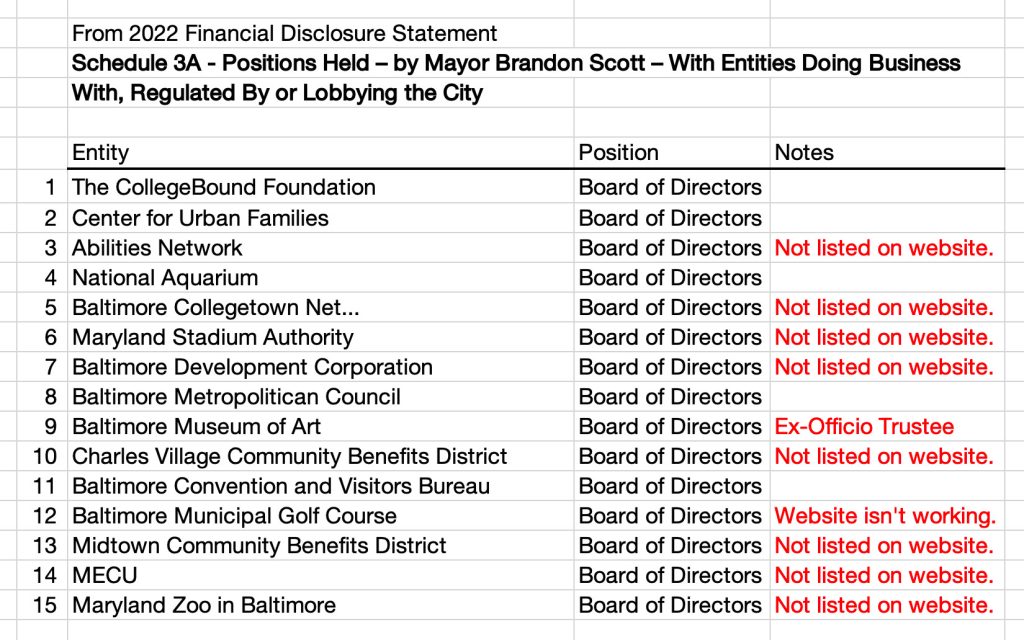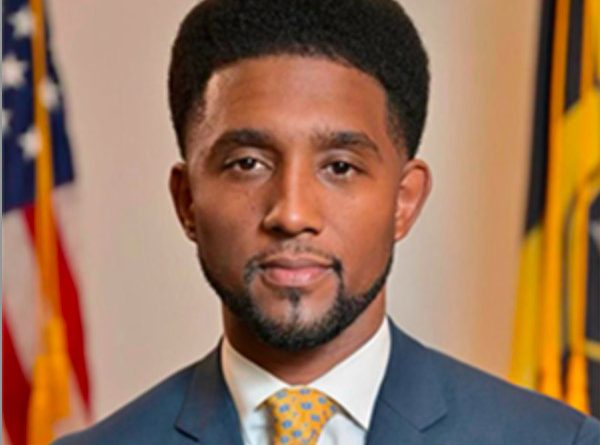Missing the Point – Problems with Mayor Scott’s Financial Disclosure Filing
Sometimes, writing an op/ed is about offering an opinion. That’s the “op” part. This time, it’s about asking questions. In this case, they are important questions that need to be answered by the Baltimore City government with the encouragement of local news media.
It’s no secret that I’m not a big fan of Baltimore Mayor Brandon Scott. All evidence suggests that he lacks the administrative expertise, experience and quite possibly the integrity, politically speaking, to save the city of Baltimore.
Ask yourself this question… “How is Baltimore a better, safer place for people to live and work, to make a decent living and fulfill their potential, than before Brandon Scott became a Councilman, President of the City Council, and then Mayor?” If you’re a candidate running against Mayor Scott, assuming he runs for re-election, it’s the first question you should be asking the voters of Baltimore.,
According to the most recent US Census data, the City of Baltimore has a population of just under 570,000 people. Once the largest county-equivalent jurisdiction in the state, it is now in fifth place. Median household annual income is just over $54,000. That’s the median, meaning that half the households in the city make less than that. In fact, over 20% of the city’s families make less than the “FPL,” Federal Poverty Level. Round numbers, over 114,000 people living in the city are “officially poor.” They don’t need some columnist to tell them. I’m sure they know who they are. The question is, does Mayor Scott?
Mayor Scott collects an annual salary of $204,000 from the city, but for whom is he really working? FYI, the Mayor of New York City only makes $258,750. For those of you who are competitive shoppers for your elected officials, Mayor Scott is no bargain.
The City of Baltimore has an Ethics Board that is home to the financial disclosure forms that prominent city officials are required to file every year. I was curious and decided to look at Mayor Scott’s most recent filings for calendar years 2020, 2021 and 2022. These filings are available to the public at the Board of Ethics financial disclosures website. A simple registration process is required before you can see individual statements.
Basically, the financial disclosure questionnaire asks filing officials to report any positions he or she holds, any ownership interests, sources of income, and gifts that might give the appearance of, or may actually be, conflicts of interest.
While clearly well-meaning, the disclosure forms and overall process suffer from three major deficiencies. For one thing, they lack verification. For all intents and purposes, they take the official’s word for the information that the official files. The penalty for lying, explicitly or by omission, is perjury, which is a very serious crime, but it’s not a sufficient deterrent without verification.
A second problem is the 30% rule that the form uses. In “Schedule 2B: Payments Made to Certain Business Entities from Persons or Entities Doing Business With City,” the disclosure form asks this question… “During the reporting period covered by this statement did you or your spouse have any substantial interest of 30% or more in any business entity?” This is all wrong. If you’re going to be hiding income or ownership interests, you’re not going to put them in your spouse’s name. You’re going to hide that income and those assets at a distance to make them more difficult to find.
The 30% milestone is much too high. You can control a company with a lot less than 30% ownership. And you can make a very substantial income from owning even fractions of 1% – of a casino, for example, or Apple. Officials should be required to list all their sources of income and ownership interests and then leave it up to the public and press to look for conflicts of interest that might not be so obvious.
Where are their tax returns? Candidates for President release their tax returns – unless, of course, they have something to hide.
And the form doesn’t consider “favors,” third-party relationships between officials, and parties not doing business with the city which is where “smart graft” takes place.
The official receives a favor, perhaps related to current income, ownership interest or borrowed funds, for example. The favor is provided by a third party related to the entity arranging for the favor. In return, the entity arranging for the favor or that entity’s “client” receives favorable treatment from the government. The trick is that technically speaking, none of the parties involved in all this is doing business with the city. None of them is a contractor or vendor from which the city purchases goods or services. The official benefits personally while keeping a long arm’s length away from the entity buying that official’s cooperation and support. Unfortunately, neither the disclosure form nor the process addresses these outsider, third-party relationships. Instead, it focuses exclusively on “persons or entities doing business with the city” and that’s too narrow a perspective.
In 2020, 2021, and 2022 filings, Mayor Scott reports zero income or assets of any kind that might be problematic. Zero.
There is mention of numerous gifts, most of which are completely inconsequential. Only two are noteworthy. One is a $789.99 bike the Mayor received from Trek. Will that affect Mayor Scott’s interest in having the city’s defenders riding around on Trek police bikes? I doubt it. The other big gift – offered, but not used if I understand one of the filing notes – is more disconcerting. The gift was from a small, non-profit organization – “doing business with <the> city” to quote from a 2022 filing – called Cities United. The gift was for a one-night stay at the Presidential Suite of a Hilton Hotel at a cost of $1298. (That’s more than many of Mayor Scott’s constituents make in a month.) My reaction is that it’s a little too pricy for a small non-profit to be spending and that Mayor Scott could sleep just as well in a substantially less expensive room.
Much, much more troublesome are the 15 board of directorships listed in the Mayor’s 2022 filing. See the list below.

ScreenshotSo, what’s wrong with this picture? What’s wrong is that directorships held by government officials are inherently conflicted. Board members, directors, and trustees are, by definition, supposed to protect the interests of the entities they oversee – even when those interests conflict with those of the City of Baltimore.
The principal job of a member of a board of directors is to make sure the entity is behaving in its best interests – which may or may not coincide with the best interests of some or all the Mayor’s constituents and their city government. To be sure, it is common for companies and organizations to invite prominent people to be on their boards of directors to be the voices of the communities they represent. That may be the entity’s stated purpose for inviting Mayor Scott to join their board, but that’s not what’s really happening.
What the entity is doing is encouraging dialogue – in this case, between it and the leading representative of the City of Baltimore – as a means of feigning interest and concern. Yes, the outsider – Mayor Scott – may make comments and suggestions to which insiders listen and react favorably. What Mayor Scott may not understand, however, is that his involvement as a director makes him the (unwitting?) target of what amounts to unregulated lobbying by the entity. He’s not only at risk of being duped, his participation on the board is nowhere near as effective a process as if Mayor Scott were to “argue” with that same entity, in public, using his bully pulpit as a thoroughly independent force on behalf of his constituents.
Instead, Mayor Scott appears to prefer the more gentlemanly forum of lunches around the inlaid tables of boardrooms and at finer restaurants and hotels. A wiser Mayor would prefer to avoid the appearance and real potential of being friends with entities whose interests may not perfectly coincide with those of his government and the people it represents.
I’m going to point out only two examples. The first is number 7, the Baltimore Development Corporation. The BDC is a quasi-government agency that Mayors use to promote certain development projects. More to the point, it is a “developer-friendly” entity that has done little or nothing for the greater city and, in particular, for the two-thirds of Baltimore’s families that struggle every day to get by. So, what do you think the Mayor is doing on the BDC’s Board of Directors? Precisely whose interest is he representing?
The other example is number 14, MECU, The Municipal Employees Credit Union. MECU is a non-profit that was created to loan money and provide other financial services to local government employees – and other people. Doesn’t Mayor Scott understand that what’s good for the credit unit, financially, might not be in the best interests of the city’s employees? Like the interest and other fees MECU charges for its services? Higher rates benefit the credit union at the expense of its borrowers. Maybe Mayor Scott thinks he’s on the board to protect the interest of his government’s employees. So, we’re to believe that MECU invited him to join the board just to argue against the credit union’s objectives?
The simple, but nonetheless meaningful point is that the Mayor shouldn’t serve on boards of directors because the role of a director is inherently in conflict with his day job. By the way, with 15 board positions, when does Brandon Scott have time to be Mayor? What, exactly, does he do all day? Who keeps track of his schedule – and where’s our copy?
Here’s the punchline… The 2022 financial disclosure filing is through December 31, 2022. Out of curiosity, I checked the websites for all the entities Mayor Scott listed for his board memberships in his 2022 filing. I was wondering who else of note might be on these boards. See the red ink in the table above. As it turns out, some of these board memberships may not be valid. In fact, 8 of the 15 entities he listed, while showing pictures and giving the names of other board members, made no mention of the Mayor and that’s a very notable omission.
What the heck is going on? Did Mayor Scott have these board memberships, but then give them up sometime this year? The bad news is that these financial disclosure statements may not be worth the paper they’re printed on. The good news is that the price of paper is rising. (Who says Economists and op/ed columnists don’t have a sense of humor?)

Les Cohen is a long-term Marylander, having grown up in Annapolis. Professionally, he writes and edits materials for business and political clients from his base of operations in Columbia, Maryland. He has a Ph.D. in Urban and Regional Economics. Leave a comment or feel free to send him an email to [email protected].

